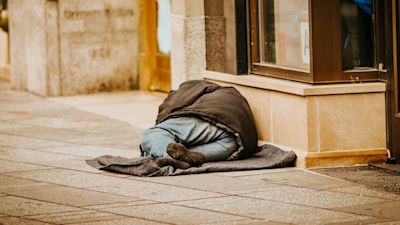Homelessness: Law banning rough sleeping could soon be repealed, Boris Johnson suggests

A law that bans rough sleeping could soon be overturned, meaning homeless people would legally be allowed to sleep on the streets for the first time in almost 200 years.
Boris Johnson said at prime minister's questions that no-one should be "criminalised" for being homeless after being asked whether he would repeal the Vagrancy Act 1824.
"No-one should be criminalised simply for having nowhere to live," the prime minister told MPs.
"And I think the time has come to reconsider the Vagrancy Act, but also to redouble our efforts to fight homelessness, as I think we have done successfully over the pandemic, but must continue to do."
What is the 1824 Vagrancy Act?
As the name may suggest, the Vagrancy Act was designed to deter "vagabonds" - an archaic description for a "person who wanders from place to place without a home or job".
Passed in the summer of 1824 - 197 years ago - the law makes it an offence in England and Wales to beg or sleep rough.
Official legislation on the government website says it can be used to punish "every person wandering abroad and lodging in any barn or outhouse, or in any deserted or unoccupied building, or in the open air, or under a tent, or in any cart or waggon”.
Rough sleepers can be issued with fines up to £1,000 if they are charged - a curious punishment given those in breach of the law are likely being forced to break it because they have no money.
How often is the law used?
In 2018 police in Windsor were told by the council leader to use the law as a way to move homeless people out of view as Harry and Meghan were in town for their Royal Wedding.
Aside from that, statistics indicate the law is not being widely used.
While there are no official statistics on use of the law, homeless charity Crisis found through Freedom of Information requests that just 28% of 305 local authorities that responded had used the law in the year to April 2017 - just 7% said they intended to use the law in the future.
The charity also found that the number of people prosecuted under the law had halved from 2014, with 1,320 people prosecuted under the Vagrancy Act in 2018.
Why do campaigners want the law to be repealed?
Opponents of the law say it does very little to help people escape homelessness - in fact they say the £1,000 fine people face only serves to keep people in the cycle of rough sleeping.
Centrepoint, a charity which helps homeless people find accommodation, says the law creates a "vicious cycle".
"In all the chaos of criminalising homelessness, no effort is made to ensure rough sleepers have the support they need to really move on - from sleeping on the streets." It adds: "The Vagrancy Act pushes rough sleepers even further away from a better life, not just taking away what small amount of security and finances they may have, but also making vulnerable people distrusting of authorities."
The latest figures suggest the number of homeless people in the UK is growing, with the coronavirus pandemic exacerbating the problem.
The Combined Homelessness and Information Network (Chain) says of the 4,227 people recorded as sleeping rough in London in 2020, 77% were doing so for the first time.
So will the law be repealed?
Following a review of the Vagrancy Act, Robert Jenrick - who at the time was housing secretary - said the law should be “consigned to history” - however, little progress has been made since then.
The review was announced as part of England's Rough Sleeping Strategy, which in 2018 said: “Those who find themselves sleeping rough are some of the most vulnerable in society and we are clear that people who sleep rough should not be discriminated against.”
In April 2021 a Westminster Hall debate took place in which both the government and opposition agreed the act should be replaced.